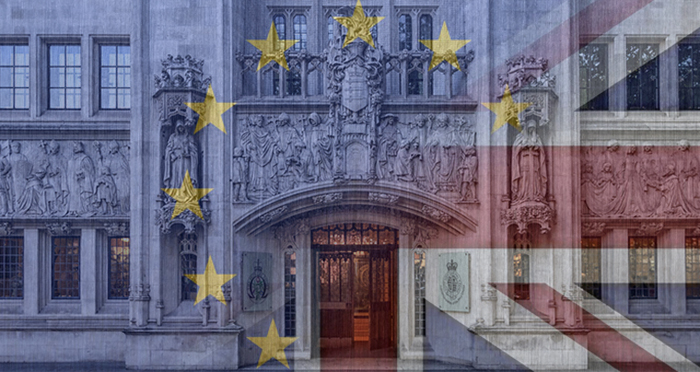Norton Rose Fulbright’s senior knowledge lawyer Andrew Sheftel explains why

The Attorney General and the Advocate General for Scotland are seeking a declaration from the Supreme Court as to whether the Scottish parliament’s UK Withdrawal from the European Union (Legal Continuity) (Scotland) Bill is within the competence of the devolved administration.
The issue arose in response to the publication of the European Union (Withdrawal) Bill in July of last year. The Bill’s starting point was that post-Brexit, the devolved administrations cannot legislate to amend retained EU-derived laws, unless the laws in question would have been within the competence of the devolved administration prior to the UK’s departure from the EU. The Bill proposed a number of consequential amendments to existing devolution legislation to reflect this position.
However, there was criticism from the devolved administrations that the EU (Withdrawal) Bill, as drafted, did not in fact return powers within areas of devolved competencies from the EU to them. Following the failure by the UK government and the Scottish parliament to reach an agreement as to the wording of the EU (Withdrawal) Bill in relation to devolution issues, the Scottish parliament introduced the legislation which is now under challenge.
It should be noted that the UK government initially sought the same declaration from the Supreme Court in relation to the Welsh Assembly’s corresponding law derived from the European Union (Wales) Bill. However, agreement was subsequently reached between the UK government and the Welsh Assembly, which reassured the Assembly that areas currently devolved will remain devolved after Brexit. Accordingly, the Welsh legislation is no longer challenged by the UK government and has since passed into law.
Returning to the Scottish Continuity Bill, according to the executive summary published by the Scottish parliament, “The [Scottish] Bill has been introduced following disagreement between the UK and Scottish governments over the content of the European Union (Withdrawal) Bill (EUWB)… in the event that the Scottish parliament does not give consent to the EUWB, it is possible the UK government may wish to remove the devolution related clauses from the Bill or, alternatively, may proceed with the EUWB without consent. If the UK government chose to remove the devolution related clauses, it could leave Scots law unprepared for the UK’s departure from the EU. In order to address that eventuality, the Scottish government has chosen to introduce the UK Withdrawal from the European Union (Legal Continuity) (Scotland) Bill.”
The Scottish Continuity Bill seeks to pre-empt problems in the continued functioning of laws in Scotland following Brexit. By way of example, according to the Scottish parliament’s executive summary, “The purpose of the [Legal Continuity] Bill is to ensure that when the UK leaves the European Union, Scots law continues to function seamlessly without any interruptions or gaps”. To achieve this it: “retains in domestic law EU law currently operating in devolved areas; gives the Scottish ministers the powers needed to ensure that devolved law continues to operate effectively after UK withdrawal; and gives the Scottish ministers the power to, where appropriate, ensure that Scotland’s devolved laws keeps pace after UK withdrawal with developments in EU law.”
To a certain extent, this largely mirrors the EU (Withdrawal) Bill (now the EU (Withdrawal) Act), which is not surprising given that both pieces of legislation are intended to provide continuity of the law on the day the UK leaves the EU. The Scottish government argue that this should mean there is consistency in the way the Scottish devolved and reserved law is dealt with.
However, there are some differences in the approach of the Scottish Continuity Bill and the EU (Withdrawal) Act, which is why the proposed legislation is the subject of challenge by the UK government. For example, section 13 of the Bill provides powers to Scottish ministers to make regulations to ensure that Scots law in devolved areas can continue to maintain consistency with EU law after Brexit, where appropriate. It also gives greater powers to the Scottish ministers than in the EU (Withdrawal) Act, by allowing them to amend retained (devolved) direct EU legislation. Further, section 17 of the Bill provides that the UK government must first obtain the consent of the Scottish ministers before they make, confirm or approve secondary legislation relating to devolved matters which modifies any retained (devolved) EU law.
The European Union (Withdrawal) Act received royal assent on 26 June 2018. Although the UK government agreed amendments on questions of devolution in light of the agreement with the Welsh Assembly, such amendments were not sufficient to prevent the Scottish government’s continued opposition to the Act.
So far as the UK government is concerned, the referral to the Supreme Court is necessary to avoid uncertainty. Accordingly, for the second time since the EU referendum, the Supreme Court will be called upon to consider important questions of constitutional law.
The matter is due to be heard tomorrow (24 July) until 25 July 2018 before a panel of seven justices.
For more commercial awareness insights, check out Norton Rose Fulbright’s blogs and articles hub.

